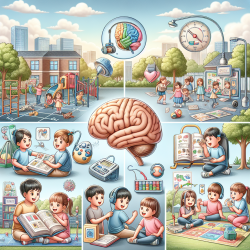As a speech-language pathologist, your role in shaping young minds is crucial. Leveraging data-driven insights to enhance your practice can significantly improve outcomes for the children you serve. One such insight comes from the research on "Evolutionary Awareness," a metacognitive framework that examines human thought and emotion from an evolutionary perspective. This blog aims to illustrate how incorporating evolutionary awareness into your practice can enhance your skills and encourage further research.
The research article, "Evolutionary Awareness," authored by Gregory Gorelik and Todd K. Shackelford, emphasizes the importance of understanding human behavior through the lens of evolution. This perspective can provide invaluable insights into the development and functioning of children's speech and language abilities. Here are some key takeaways and their practical applications:
- Understanding Developmental Milestones: Evolutionary awareness helps us comprehend the natural progression of speech and language development. Recognizing that certain behaviors and milestones are rooted in our evolutionary past can guide more effective interventions. For instance, understanding the evolutionary basis of language acquisition can help tailor therapy sessions to align with children's innate learning patterns.
- Behavioral Interventions: The research highlights the importance of identifying evolved patterns of behavior before attempting to modify them. This is particularly relevant in speech-language pathology, where understanding the evolutionary roots of communication behaviors can lead to more effective interventions. For example, children may exhibit certain speech patterns that are evolutionarily adaptive but may require modification in a modern context. Recognizing these patterns can help in developing targeted interventions that are both effective and respectful of the child's natural tendencies.
- Ethical Considerations: Evolutionary awareness brings an ethical dimension to our practice. Understanding that our actions can have long-term effects on children's development emphasizes the importance of ethical decision-making. This perspective encourages practitioners to consider the broader implications of their interventions, ensuring that they promote overall well-being and not just short-term gains.
- Interdisciplinary Collaboration: The research advocates for a consilient approach, integrating insights from various disciplines such as biology, psychology, and anthropology. This interdisciplinary collaboration can enrich our understanding of speech and language development, leading to more holistic and effective interventions. Collaborating with experts from other fields can provide new perspectives and innovative solutions to complex challenges in speech-language pathology.
Incorporating these insights into your practice can lead to more informed and effective interventions, ultimately improving outcomes for the children you serve. Furthermore, this research encourages ongoing exploration and collaboration, fostering a culture of continuous learning and improvement.
To read the original research paper, please follow this link: Evolutionary Awareness.










